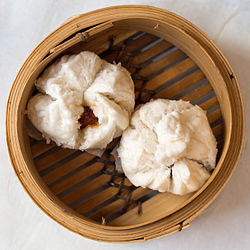Char siu baau
 |
|
| Alternative names | Char siu bao or keke pua'a |
|---|---|
| Type | Dim sum |
| Place of origin | China |
| Region or state | Guangdong |
| Serving temperature | Hot |
| Main ingredients | Pork |
| Variations | Baked or steamed |
| 501.2 kcal (2098 kJ) | |
| |
|
| Cha siu bao | |||||||||||||||||||
| Simplified Chinese | 叉烧包 | ||||||||||||||||||
|---|---|---|---|---|---|---|---|---|---|---|---|---|---|---|---|---|---|---|---|
| Traditional Chinese | 叉燒包 | ||||||||||||||||||
| Hanyu Pinyin | chāshāobāo. | ||||||||||||||||||
| Literal meaning | "roast pork bun" | ||||||||||||||||||
|
|||||||||||||||||||
| Transcriptions | |
|---|---|
| Standard Mandarin | |
| Hanyu Pinyin | chāshāobāo. |
| Hakka | |
| Romanization | chaseu bao |
| Yue: Cantonese | |
| Jyutping | caa1siu1 baau1 |
| Southern Min | |
| Hokkien POJ | chhe-sio-pau |
Cha siu bao or Chāshāobāo is a Cantonese barbecue-pork-filled bun (baozi). The buns are filled with barbecue-flavored cha siu pork. They are served as a type of dim sum during yum cha and are sometimes sold in Chinese bakeries.
There are two major kinds of cha siu bao: steamed (蒸, zhēng) and baked (烤, kǎo). Steamed cha siu bao has a white exterior, while its baked counterpart is browned and glazed.
Cha siu refers to the pork filling; the word bao simply means "bun".
Although visually similar to other types of steamed baozi, the dough of steamed cha siu bao is unique since it makes use of both yeast and baking powder as leavening. This unique mix of leavening gives the dough of cha siu bao the texture of a slightly dense, but fine soft bread.
Encased in the center of the bun is tender, sweet, slow-roasted pork tenderloin. This cha siu is diced, and then mixed into a syrupy mixture of oyster sauce, hoisin sauce, roasted sesame seed oil, rice vinegar, shaoxing wine or dry sherry, soy sauce, sugar and cornstarch.
In Hawaii, the item is called Manapua. Its name is a shortening of the Hawaiian mea ʻono puaʻa, meaning, "delicious pork thing." In the U.S. mainland, the Chinese term is commonly used. The Chinese brought this dim sum item with them when they were brought over as plantation workers. In American Samoa and its surrounding islands, the item is referred to as keke pua'a, literally meaning "pig cake".
...
Wikipedia
